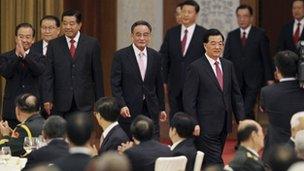How China is ruled: Politburo
- Published
Politburo
Every significant decision affecting China's 1.3bn people is first discussed and approved by a handful of people - almost all men - on the party's political bureau (politburo), the nexus of all power in China.
The 24-member Politburo is elected by the party's central committee. But real power lies with its smaller standing committee, which works as a kind of inner cabinet and groups together the country's most influential leaders.
How the standing committee operates is secret. But its meetings are thought to be regular and frequent, often characterised by blunt speaking and disagreement.
Senior leaders speak first and then sum up, giving their views extra weight. The emphasis is always on reaching a consensus, but if no consensus is reached, the majority holds sway.

Once a decision has been made, all members are bound by it. Although policy disagreements and factional fighting are widely believed to take place in private, it is extremely rare for these to break into the public domain.
When they do - as happened in 1989 when the leadership battled over how to deal with the Tiananmen protests - it is a sign of an all-out power struggle.
Members of the standing committee also share out the posts of party general-secretary, premier, chairman of the National People's Congress, and head of the Central Discipline Inspection Commission.
The full politburo also tends to include party secretaries from big municipalities like Beijing and Shanghai, and from important provinces like Guangdong.